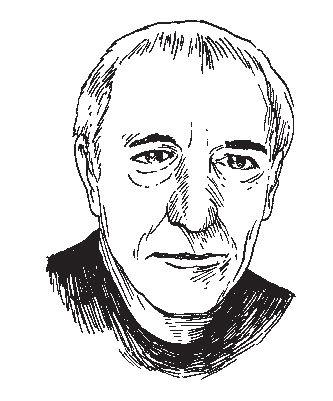I got turned on to Bruce Jay Friedman a few years ago when a novelist friend referred to him as “one of the lost writers of the ’70s” and recommended his novel About Harry Towns, about divorce and cocaine. I loved the spare, mordant style, and quickly devoured his novel A Mother’s Kisses (about a mother who accompanies her son to college). Later I read Stern, his first novel, while struggling with my third, and told my husband that there was no point finishing it because I would never be as good as Friedman.
Stern (1962) is about a man who comes undone when he learns that his neighbor may have referred to his wife as a “kike” and also may have noticed that she wasn’t wearing underwear. Friedman has published five other novels, five collections of short stories, three plays, and several works of nonfiction, including Even the Rhinos Were Nymphos. His latest story collection, Three Balconies, has just been published by Biblioasis.
His short story “A Change of Plan” was adapted by Neil Simon and Elaine May into the movie The Heartbreak Kid. He wrote Doctor Detroit, Stir Crazy, and Splash, for which he received an Oscar nomination. The Steve Martin film The Lonely Guy was based on Friedman’s book.
Friedman suggested we meet at the Century Club, a private club for men and women in the arts and letters on West Forty-third Street that is surrounded by an aura of secrecy. I arrived at six o’clock on a chilly spring night, fifteen minutes early. There was a board on one side of the entryway with all the members’ names—J. Galassi, W. Zinsser, and J. Feiffer were a few that I recognized—and colored pegs indicating whether the members were in. A few minutes later Friedman arrived, wearing a tweed coat and hat, strongly built and dapper. “Are you early or am I late?” he asked in a melodious, lightly Bronx-accented voice, putting his hand on my arm. He took me upstairs and we talked in the library over wine, and then in the dining room over clams, veal, and lamb, until we were the last guests to leave the club.
—Amy Sohn
I. “BED WETTERS SAY, ‘NICE HORSEY.’”
THE BELIEVER: Your characters suffer from a heightened self-consciousness. They see the way others act and want to be like them but can’t. Do you feel self-conscious?
BRUCE JAY FRIEDMAN: Like any other young person that didn’t have a trust fund and came from the Bronx, I did. It has waned somewhat.
BLVR: Did you grow more confident...
You have reached your article limit
Sign up for a digital subscription and continue reading all new issues, plus our entire archives, for just $1.50/month.
Already a subscriber? Sign in





